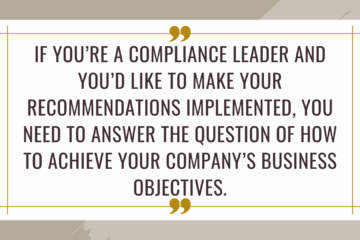What Happens When Founders Refuse to Hire In-House Compliance Team and When Is the Right Time?
Today, I wanted to tell you about what happens when early-stage startup founders resist/refuse/delay/feel reluctant to hire compliance people and ask other team members to do compliance instead (or even prefer to do it themselves):
- Do it yourself and work harder and longer or ask your Customer Support person or CFO or another team member to “step up”: It takes forever for a non-compliance person to create documents, they are not familiar with basic terminology, and they make very basic mistakes, and when the documents produced by non-experts get into the hands of banking partners, auditors or regulators, it’s very evident that the company is immature.
- Do nothing: This happens when there is a compliance person on the team but they are overloaded and desperately keep asking for help, in which case all projects within and outside compliance are delayed and the organization is spending a lot of time resolving the division of labor conflicts.
- Hire Big 4 consultants for projects: This is the most costly solution and takes longer than anything else (because large companies have to follow their own customer approval and quality assurance processes), it does not generate any know-how in-house… You may think it’s a safer choice or “safe bet” but in fact, it’s not because as a founder you don’t actually want to be “safe”, you want results and progress, and institutional help is always slow and never innovative or original.
- Join free webinars, re-use random templates from the internet that look relevant, and ask your founder-friends via Twitter what they do and what can you copy without hiring anyone: You will get even more confused than before because responses will be inconsistent and not exactly applicable, and if you try to apply random advice, most likely you will not be able to finish things and you most definitely create very inconsistent documents.
When it’s time to hire your first (possibly part-time) compliance officer? – When any of the following scenarios is present:
- you regularly need to submit external documents to banks, regulators, investors, business partners or auditors,
- you have more than 20 actively transacting customers at any time,
- when the law says your business model needs one and the law requires a compliance officer to be an independent person who is not a part of the management or executive team.
Talk soon!


